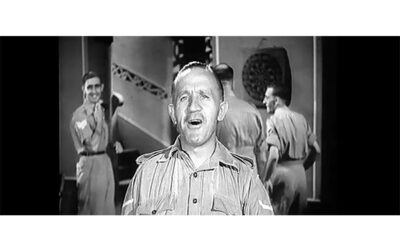It’s a collection described as “gold dust” by the North West Film Archive and now dozens of forgotten messages filmed by soldiers in the 1940s will be aired on Channel 4.
Messages Home: Lost Films of the British Army has been made for the channel, in association with Oxford Scientific Films, the NWFA and Imperial War Museum.
As previously reported, the films, dating from the 1940s had been lying in a basement of Manchester Town Hall. Alongside them was the original paperwork, which not only identified the soldiers, but also the name and addresses of those back home.
“They are filmed messages – all the reels contain is a series of men coming forward to deliver their message to the camera, and then they were shown at the cinema back home, to an invited audience of relatives. And then they were simply stashed,” explained Marion Hewitt director of the NWFA, which is part of Manchester Metropolitan University.
“Why they happened to end up in the town hall we have no idea. We don’t know when they were put there or who decided to save them. Part of the story of the Calling Blighty films is that there were 391 issues filmed, and only about 50, that we know of, have survived. I think the general attitude was ‘We’ve shown that, so we don’t need to keep it.’”
The soldiers filmed were the 14th Army, known as The Forgotten Army, because they were sent to the Far East. They were poorly equipped and didn’t get home leave.
Hewitt said that the films were basically a morale-building exercise:
“Because of their situation out there, there was a lot of grumbling. Letters were so important to the families and the men. I think it was a newsreel cameraman who made a few messages home for the mainstream newsreels, but because they were shown all over the country, nobody knew who the two blokes were in the newsreel clips. So the newsreel company stopped doing them, and said to the army cinematograph unit “Why don’t you do these?” So that’s how it came about.
Channel 4 documentary will tell long-lost tale of Manchester’s “Calling Blighty” soldiers
“It was picked up by the army, so there was something much more substantial to send home to the families. The men who appeared in them would have been gathered together when they were on leave in camps, where they would play ping pong and swim and do a bit of tourist travelling around the sites. So a camera crew would turn up at the rest camp and say “Right, who’s from Wigan?” and gather a group of men together to film something that would then be sent back for a special screening in Wigan.”
It’s this screening that was recreated at Home, in Manchester, with filmmakers bringing as many families of the veterans to Manchester as they could
It was filmed by Oxford Scientific Films, with the hour-long documentary to be aired on 26th June on Channel 4 to commemorate the 70th Anniversary of VJ Day.
Some of the stories featured include Ann Alsop, who’d never met her father. She was 3 when he was killed in action – her mother was pregnant when he went to war. Her mother later remarried and it was only when she died that Alsop learnt about her origins through some photographs. When the documentary team tracked her down she was able to see moving pictures of her father and hear his voice, for the first time.
“I think she found that very moving. When she saw the film for the first time, she was very quiet, but she didn’t seem very upset. I think it took a while to realise what it actually meant to her. She became more and more moved as the story developed,” said Hewitt.
The programme has been executive produced by Emma Morgan, written by Simon Berthon and directed by Paul Berczeller. It was commissioned by Rob Coldstream, commissioning editor of History at Channel 4.









